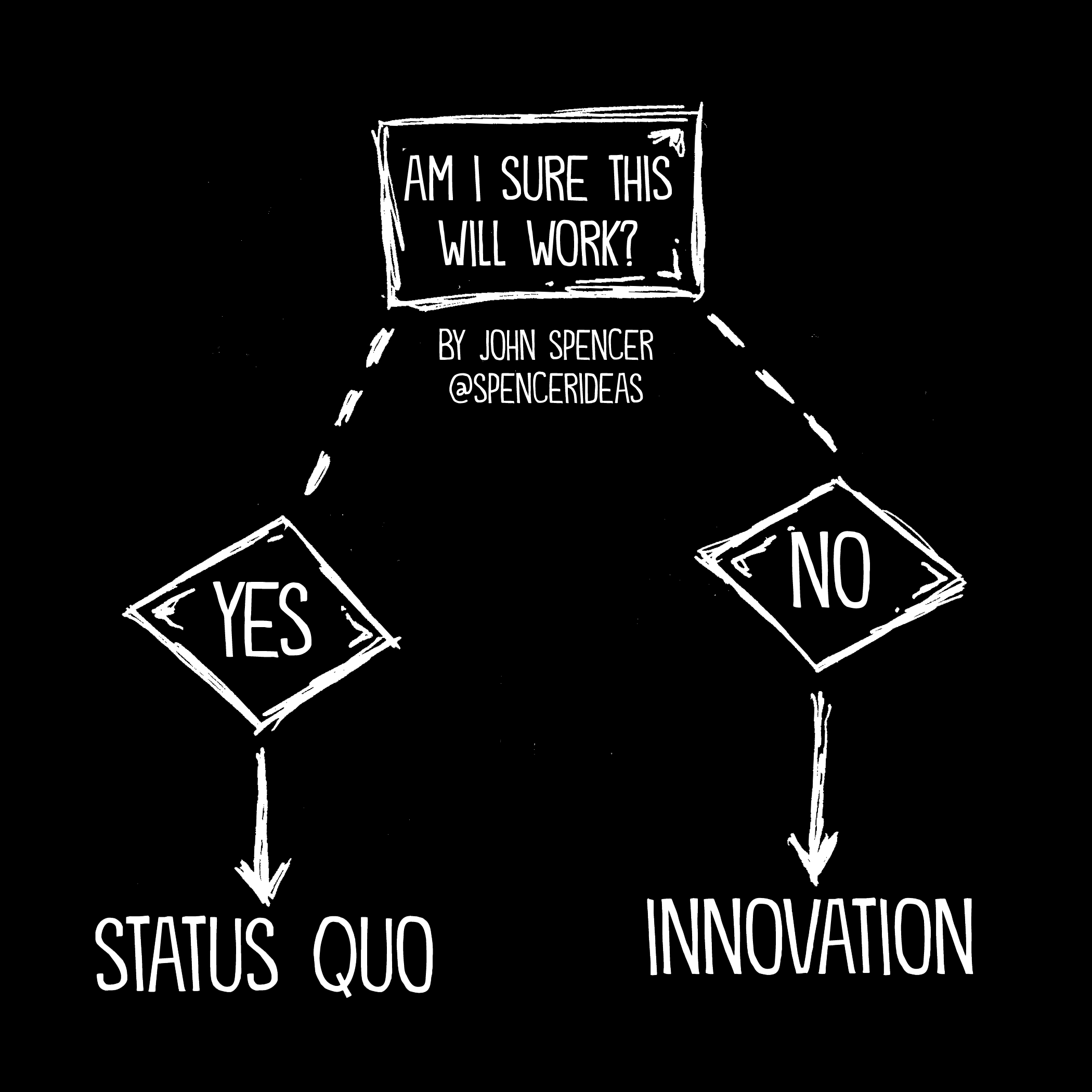Innovate Like You Want to Innovate
I love this graphic by John Spencer and I have been using it heavily when explaining innovation to teachers and administrators. It’s simple, but not easy. In fact, no one ever said that innovating would be easy. When you look at the long list of innovators: Steve Jobs, Leonardo Da Vinci, Ada Lovelace, Benjamin Franklin, Albert Einstein, Bill Gates, Elon Musk, Richard Branson, etc… not a single one of them innovated easily. They all struggled at one point in their lives. So, when I look at this graphic, I love how this simple question can lead to deep reflection.
We all love certainty. There are plenty of examples of things or events are guaranteed to happen. When I pick up my children from school, I want a guarantee that they will all be there waiting to go home (and I am positive that they feels the same way). When I get in my car each morning, I want it to start every time; I don’t want my starter to stop working or to be out of gas. When I wake up in the morning, I expect the sun to be exactly where it is supposed to be. Guarantees are not bad. They are things we rely on. Notice, however, that none of these are examples of innovation, and not a single one of them shows me stepping out of my comfort zone. When John Spencer asks: Am I sure this will work? what he is really asking is Are you comfortable with taking a risk? When I open up a blank document and begin typing a poem or story or blog post or chapter to a book, am I comfortable with it not going as expected? When I go for a walk and take a different path, am I prepared to get lost and possibly see something I have never seen before? When apply for that job, am I comfortable with being turned down? When I try something new in my classroom, am I prepared that it will go horribly wrong? All of these involve a good dose of fear and require us to push past our fears to take risks.

Being innovative has never meant being fearless. Pushing through our fear of failure is a huge part of creativity, innovation, and changing the world. We all love guarantees, but if you want to do something that no one has ever done before, or create something out of nothing, or inspire people by your ideas and actions, then you need to be uncertain and be comfortable being in that uncertainty from time to time.
Tim Ferriss has this mental exercise called Fear Setting. He starts by asking some pretty large What If questions, detailing each one, listing all that may be preventing you from accomplishing your goal, and then describing what would you could do if the absolute worst happens; how would you repair the damages? This exercise is a great way to begin living in that uncertainty and wrestling with fear. He asks, What might be the benefits of an attempt or partial success? Ferriss then draws out the cost of inaction over the period of 6 months, 1 year, and 3 years. By doing this cost-benefit analysis, he often observes that the scariest things we want, the craziest ideas that we never act on, are often not that scary and many times, failure isn’t as devastating as we imagine.
Not only is it important to begin asking yourself Am I sure this is going to work, it is also vital that we practice living in that discomfort where things don’t always work. Being innovative is not about never failing; being innovative is about failing over and over and over again. I am sure many of you have seen quotes about failure:
It always seems so inspiring to read these quotes from Robert Kennedy and Thomas Edison! Have you ever read one of these quotes and then said, maybe aloud, Well, that’s easy for them to say! They did [fill in the blank]! It’s hard for us to imagine Thomas Edison failing 10,000 times because we are all benefiting from indoor lighting. It is difficult to imagine Winston Churchill bouncing from epic failure to utter disaster because today, he forever lives in infamy as the prime minister who brought the United States and Soviet Union together to defeat Adolf Hitler. We weren’t sitting in Edison’s workshop watching him fail over and over again cursing the light bulb. We never felt the impossible weight of trying to defeat Nazi Germany. We are looking at all of these things after the fact. Were they sure that what they were attempting was going to work? Nope! They were just as frustrated as we often are in our daily struggles.


 Previous Post
Previous Post Next Post
Next Post